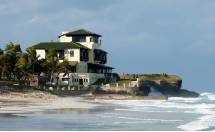Recently a large number of Russia publications have been reporting on what and for how much Russians are buying real estate abroad. The traditional discussions of the investments of Russian oligarchs in real estate are being crowded out by reports on the preferences of middle-class Russians. RBC even did a study to find out in which countries our pensioners could live comfortable by renting their apartments here. It turns out that the range of countries is quite large – the average pensioner could live quite well not only in Latvia, Estonia, Lithuania or Bulgaria but also rent abodes in Spain, Italy and on Cyprus. The precondition here being that the pensioner own and apartment of at least two rooms in Moscow.
While for pensioners this is some faint possibility or potential, the Russian middle class is actively and boldly investing in real estate. Some see the purchase of an apartment abroad as a promising investment of disposable income, but most simple want to acquire a dacha near the sea, for themselves and for their elderly parents. If the purchase is in major city, then it is usually for a child who plans on studying at a local university.
It seems that the most active Russians have found an appropriate solution to the dilemma of whether to emigrate from Russia or remain. The purchase of real estate abroad to a certain degree eases the pressure. Flight from Russia for good is replaced by a less psychologically traumatizing “life in two houses”. This does not mean that many who acquired real estate abroad will not over time move there permanently. Only time will tell. However, experts are predicting a capital outflow from Russia of $55 to 60 billion this year, which is about 3% of the country’s GDP – no small amount.
Only one-fifth of real estate is purchased in major cities, while the rest is situated in resort areas. It is not uncommon for Russians to using funds provided by European banks to make these purchases. According to the Russian Central Bank, over the past three months Russians have spent $414 million for this purpose, the newspaper Svobodnaya Pressa reports. Approximately two-thirds of the acquired real estate has come in the form of apartments while rest are houses and villas.
One of the reasons which experts point to as a factor driving the growth in investment in real estate is the banking crisis in Cyprus. In order to mitigate their risks, whose with Cyprus bank accounts are have decided to invest in real estate.
So where to Russians prefer to purchase real estate? The desire of most to have a dacha near the sea dictates buying trends. This means Turkey, where Russians in the first quarter of 2013 acquired 3000 apartments and houses, and it seems that Russian compatriots have become the market leaders on the Turkey real estate market. Another hot location is Bulgaria.
“There is a very wide spread in price categories – depending on the country and class of real estate,” says Sergei Sander, Director of the Leading Properties of the World (Switzerland). “It is one thing to buy a cheap residence in Bulgaria or Spain and quite a different thing to acquire an expensive apartment in Switzerland, France or Great Britain. For example, real estate in Bulgaria starts at 30,000 to 50,000 euro for a one-room apartment with 40-50 square meters. Our company works with elite real estate where the price per square meter starts a 4000 euro per square meter and is limited only by the buyers imagination (it can reach 40,000 euro per square meter). However, one should keep in mind if considering Bulgaria that the economic stability of the country is in question, which is why the housing prices are low. However, starting from 50,000 euro you can acquire an apartment in Germany, whose economic reliability is not in doubt.”
Incidentally, many countries are already fighting to appeal to Russian investors. One of the most effective instruments is to offer residency and a Schengen visa if real estate over a certain value is acquired. This is offered by Russia’s neighbors Lithuania and Latvia as well as Cyprus, Portugal and Hungary. Default-stricken Greece recently joined this club, hoping to attract rich Russians by offering them a five-year residency permit with the possibility of extension and unfettered travel across the entire European Union. The minimum qualifying amount for such a deal is 250,000 euro.

